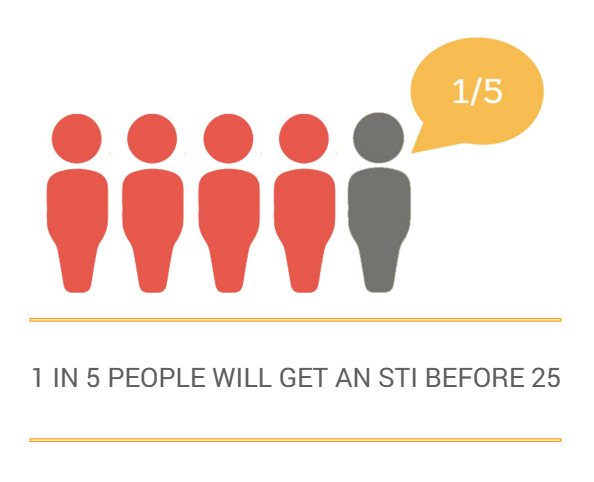
Let’s talk sexually transmitted infections.
As possibly one of the biggest taboos and causes of embarrassment with regards to sex and dating, never has it been more imperative to be able to speak about STIs.
In 2014, there were approximately 444,000 STI diagnoses made in England alone [Public Health England].
An overwhelming 47% of these diagnoses were for Chlamydia, the usually-symptomless and most commonly diagnosed infection.
1.6 million Chlamydia tests were taken by 15-24 year-olds in 2014, of this 138,000 diagnoses were made. If caught early, Chlamydia in particular can be treated easily with antibiotics. However if left untreated, Chlamydia can damage a woman’s fallopian tubes after being in the body only a few months.
In women, untreated STIs such as Gonorrhoea and Chlamydia, can also lead to pelvic inflammatory disease (PID), which is the inflammation of the internal female reproductive organs. PID may lead to chronic pelvic pain, ectopic pregnancy, or infertility.
Untreated STIs such as Gonorrhoea and Chlamydia can also put young men at risk of testicular infections and in rare cases, infertility.
These facts alone mean that being tested IS a big deal. And it is exceptionally important that us, as young people, actually make the effort to get tested regularly.

There are many reasons why talking about sex and getting tested with your partner may be difficult. You may feel that you will offend your partner or make them feel uncomfortable by asking if they have ever been tested. Or it could be that you and your partner are so quick to want to get intimate that you don’t want to bother with getting tested before you start hooking up.
Furthermore, there are so many STIs that are completely asymptomatic, meaning they show no symptoms at all. Asymptomatic STIs are particularly dangerous because they allow diseases to progress and increase the likelihood it will be spread unknowingly; the person transmitting the disease and the person contracting it can be completely unaware that they are sick at all.
STIs often have symptoms that mirror other illnesses, making it difficult to diagnose if an STI isn’t being looked for specifically. Many STIs are accompanied by flu-like symptoms, such as sore throat, fever, muscle aches, and swollen glands. These confusing symptoms make it easy to mistake a sexually transmitted infection for a cold or flu.


Many people are worried about going to get tested as their unsure of what is involved. Usually for women it is a self-swab test, urine sample or blood test, nothing particularly scary, and for Chlamydia and Gonorrhoea it is just a simple self-collected swab on a cotton-wool bud. No intrusive examinations, and the results have a really quick turnaround which are usually confidentially text to you.
Lucky for us in the UK, getting tested is free on the NHS, and you have a number of options as where to go. GUM or sexual health clinics are dotted around the country, or pop to your doctors. There’s no need to be embarrassed – these doctors have seen it all before and being tested is an important part of looking after your health.
Are you worried about your sexual health, or just fancy getting checked? Find your nearest GUM clinic here: https://www.fpa.org.uk/find-a-clinic

[Infographics created bespoke by and for evegreenow.com]

